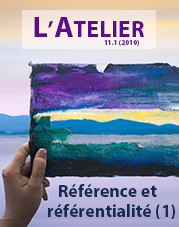Vol. 11 No. 1 (2019): Reference and Referentiality 1

What, if anything, does literature talk about? Aristotle’s theory of mimesis poses the question of the referential relationship between an object and its representation, between the world and language. If, for Saussure, language puts an end to the world with the advent of the sign, is it still possible to say that writing consists in describing, or even giving shape to the world, to the experience of the world? In literary criticism, the referential prism postulates the preexistence of a stable system of references—places, events, characters, historical and cultural context—as part of the reading pact that the literary text might make use of in order to become the metonymical space of a historical time. But does this referential prism still hold in the face of the radical power of language, and in the face of what this power does to the world?
This issue of L’Atelier not only seeks to examine writing as mediation, as that which happens to the world, and has the capacity to transform or even generate the world, but also as that which is itself created within the world and by the world. One of the goals of this issue will be to think about how the assumption that a literary work mirrors the world is called into question by that which escapes specularity, or in other words, by everything that happens to the text during the process of poiein, by everything that makes the referent disappear, replacing it with an intransitivity or an autotelism of language. Metaphors, images, the figurative, the implicit, translation, polysemy, hermetism, the instability of signs, subjectivity, modality, affect, experience, the indeterminate, the possible, the imaginary, the fabled, are some of the processes or modes that displace the referential system and reveal its illusion.
— Issue co-edited by Isabelle Alfandary, Priyanka Deshmukh and Juliana Lopoukhine

